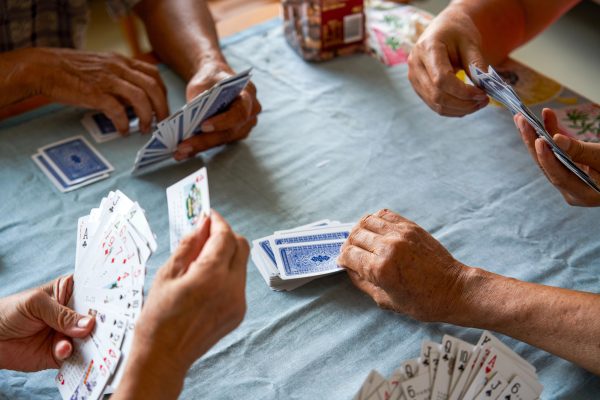By Marina Yue Zhang
Copyright thediplomat

As I calculated odds, discreetly signaled to my partner, and weighed risks amid ambiguity, I realized why Guandan – a card game known as “throwing bombs” – has become a ritual for cadres and entrepreneurs alike. Its mechanics mirror China’s economy with unsettling precision. The game had started as refuge from a heated dinner conversation at a Beijing private club. Business owners, officials, educators, filmmakers, and an old friend visiting from New York had gathered on an early autumn evening when the air was high and clear, though still damp with summer heat. A globally celebrated screenwriter had remarked that films were now judged not only for political content but also for geopolitical tone. The reach of China-U.S. rivalry, he sighed, was only an arm’s length away. As tensions rose over the tech war and Mao’s legacy, we turned to cards to avoid a row. Beneath Beijing’s clean and orderly surface runs an undercurrent of unease – hard to define, but impossible to miss. Much seemed unchanged from when I left a decade ago: my favorite second-hand bookstore still stood, its shelves thinner but now offering delivery to overseas buyers. New subway lines traverse a city of more than 20 million people. Yet what was once a place full of hope has become something more fraught – an ethos of survival in an economy where the rules keep shifting. Guandan and the Logic of Survival In Guandan, played with two decks, two teams compete to “upgrade” by finishing first. Victory depends not on a single winner but on both partners, who cooperate strategically and signal through card play. Sometimes a strong hand is deliberately slowed to help the partner advance. Luck decides the initial draw, but once a team wins, path dependence takes over. Winners exact tribute – unless the loser holds double dawang (full-color jokers) and can fangong, reversing the penalty. Wild cards can form sudden “bombs” that upend the game, yet even the strongest hand – a tianwang zha (“heavenly bomb”) – is worthless if mistimed. The goal is not individual glory but collective advantage over the opponent. Until the final hand, a comeback is always possible. The lesson is clear: endure, adapt to uncertainty, and seize the right moment. That same logic pervades the real economy. In one textile cluster outside Beijing, firms bid fiercely on Alibaba’s platform for scarce export orders. Last quarter’s winner survived on a margin of just 1.3 percent. Upstream suppliers, mostly state-owned, have consolidated; downstream brands stretch payment terms. For small and medium manufacturers caught in the middle, bargaining power has diminished. Like players dealt a bad first hand in Guandan, their only viable strategy is to hang on, stay alive, and hope for a chance to rebound. The macro data tell the same story. August brought industrial output growth of just 5.2 percent year-on-year while exports contracted 0.4 percent – figures that capture the squeeze manufacturers face daily. Fixed-asset investment dropped by 6.3 percent, the weakest reading in years, as companies hoarded cash rather than expanding. The property sector remains a millstone, with investment down 19.4 percent and prices declining in nearly all of China’s 70 major cities. Even bright spots reveal fragility: car production grew 10.5 percent, but semiconductor output cooled dramatically from 15 percent growth in July to just 3.2 percent in August. Like Guandan players, manufacturers and households alike are sacrificing margins while waiting patiently for a chance to change the game. Policymakers continue to call for supply-side upgrading, but most factories lack the balance sheets to pivot. For now, the rational strategy mirrors the card game: survive today by sacrificing profits, wait for a wild card or for others to falter, and hope that the next “heavenly bomb” falls your way. Temporal Compression and Zero Tolerance of Mistakes Another incident stood out from my trip. I drove to the Ming-era Water Great Wall with two young professionals. The unfinished overpasses along the way felt like a metaphor for China’s economic development – ambitious in design, but bewilderingly complex and difficult to grasp from below. My passengers both worked “996” schedules: 9 a.m. to 9 p.m., six days a week). They described themselves as yizu – the “ant tribe,” educated migrants who work hard but live precariously in first-tier cities. “We grew up on gaotie (high-speed G-trains),” one explained. “You can reach many different cities within hours. If you miss one, another comes in half an hour.” Life is like that – you board a train and come to a big city, much easier than the previous generation ever could. But once you’re settled and locked into intangible assets that don’t even belong to you, changing course becomes complicated. “For us, there’s no space, no time, and no forgiveness for mistakes,” this young professional concluded. The kuaidi (instant delivery) economy intensifies this temporal compression. Apps promise to deliver everything – meals, coffee, medicine, and clothes – within 30 minutes, guided by BeiDou navigation with near-perfect precision. Physical shops are vanishing, replaced by livestreaming commerce; meals in restaurants are increasingly prepared in industrialized dark kitchens; and AI-optimized fulfillment centers squeeze out every possible delay. Friction disappears – and with it the chance encounters that once gave daily life its texture, except perhaps when playing Guandan. The paradox is stark: technology brings speed and convenience, but life decisions feel irreversible for many young people. This generation approaches major choices defensively, treating missteps as permanent. The economic data reflect this anxiety. Retail sales slowed to just 3.4 percent year-on-year in August, with restaurant revenues up merely 1 percent as price wars and official curbs on banquets squeeze margins and demand. Smartphone sales growth halved to 7.3 percent. By contrast, jewellery sales surged 16.8 percent, buoyed by record gold prices – a sign that households prefer storing value to making new commitments. That reticence to lock in new expenses is reflected in the birthrate. China recorded just 9.5 million births in 2024, up slightly on 2023’s figure but still the second-lowest number since the founding of the People’s Republic. A kindergarten that had six classes in 2017 now has two. When I asked the couple about marriage and children, they shook their heads: “No, we’re only dating.” After rent, their discretionary budget was only 1,200 yuan a month. In compressed lives, big commitments resemble boarding the wrong train: once on, there may not be a way back. Anti-Involution and the Retreat to Minimalism Neijuan (“involution”) – competing ever harder for ever smaller returns – has become the defining malaise; from high-school exams to shrinking export orders. The state now preaches “anti-involution.” China saw a record 11.79 million university graduates enter the labor market in 2024, while persistently high youth unemployment rates – hovering near 19 percent – have intensified household anxieties across the country. Many respond with tangping (“lying flat”) or bailan (“let it rot”). Others survive through kenlao – “eating the old,” or living off one’s parents. This is not apathy but adaptation. The economic backdrop makes retreat rational. Manufacturing investment contracted 1.3 percent in August while property investment plunged 19.4 percent. Even infrastructure spending, despite heavy bond issuance, shrank 6.4 percent. Opportunities for upward mobility are narrowing, ladders once held open now pulled away. Lying flat can be seen as optimization under constraint, a new kind of social psychology. The previous generation’s playbook – study hard, work harder, buy property, raise children – worked during an era of ascent and hope. That formula no longer guarantees opportunity, let alone success. Today’s youth are rewriting the rules: not pushing harder in a rigged game, but recalibrating behavior to manage risks in an age of contraction and uncertainty. The Global Stakes Taken together, these three windows reveal a society shifting from a growth mindset to survival mode – a response to both domestic strains and the geopolitical pressures China faces. Speed has stripped away the slack once available for course correction, while involution has become a structural drag on productivity and consumption. For the global economy, this psychological shift matters enormously. China’s demand once powered commodity cycles, shaped Australian mineral exports, and buoyed Southeast Asian supply chains. If households retrench and youth opt out, the ripples will spread from Indonesian palm oil plantations to German auto plants. A risk-averse China means weaker global growth, and demographic headwinds no stimulus can easily reverse. Beijing presents an orderly façade. Parents extol the grandeur of the Great Wall while quietly plotting overseas education for their children. Dinner guests toast national strength yet privately calculate survival strategies. The wild card remains in the deck, but the real question is whether to combine it into a bomb and throw it now or wait for others to falter – a hard calculation facing all uncertainty and ambiguity. On my last night, a local official invited me to play Guandan despite campaigns to discourage it among cadres. “They can’t outlaw it,” he laughed. “It’s intangible cultural heritage.” Then, he added, more softly: “And everyone needs a safe space to admit they’re scared.” As in Guandan, the next move will determine not only who stays in the game, but how long the game itself can go on. For China’s trading partners and competitors alike, understanding this psychology has become essential to navigating an increasingly uncertain world order.



